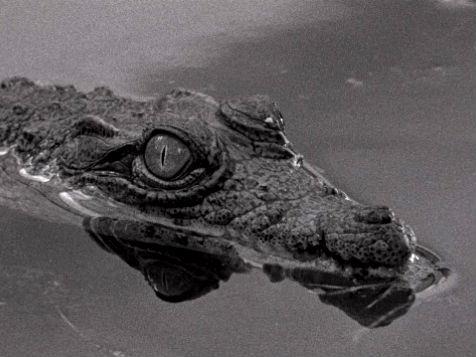For his third feature, Portuguese helmer Miguel Gomes (The Face You Deserve and This Dear Month of August) borrows the title and two-chapter structure from the last film made by silent cinema master F.W. Murnau in 1931 to evoke a peculiarly romantic atmosphere as a tale of forbidden love, obsession and crime unfolds in reverse.
The first chapter of Tabu (Paradise Lost) is set in modern day Lisbon, where temperamental, gambling-addict senior Aurora (Laura Soveral) maintains a paranoid relationship with her Cape Verdean maid Santa (Isabel Cardoso) and quickly becomes the latest cause for her Catholic do-gooder, social activist neighbour Pilar when she falls chronically ill. On her deathbed, Aurora has one last wish: to see a man named Gian Carlo Ventura (Henrique Espírito Santo).
In the second half (Paradise), Ventura unveils Aurora’s past in an unnamed Portuguese African colony, where unaware of the politically volatile world around them and as an empire was about to fall, the two were illicit lovers. Their white friends also seem to be equally unfazed by the political events surrounding the many servants who bring them lemonade as they dance to rock’n’roll by a pool.
Miguel Gomes’s quiet and fair reflections on the European colonisation of Africa in Tabu are also a cinematic exploration of fragmented memories through highly poetic and surprisingly effective off-screen narration. The film successfully revives the magical aura of love stories and adventure present in the pre-talkie days of cinema by taking spectators back to an era of innocence to emphasise the very own loss of it.
Exquisite black and white photography by Rui Poças (shot in 35mm stock for Lisbon scenes and 16mm stock for an imagined colonial Africa – filmed in Mozambique) is used to great effect as Gomes celebrates a medium whose days are numbered and deliberately reconstructs and questions Hollywood’s colonisation of the imagination with its inspired, nostalgic visual aesthetic.
Gomes manages to keep elephants out of the room by placing crocodiles there instead. From a quasi-ethnographic prologue where the animal eats an explorer, a melancholic crocodile appears consistently throughout the feature bearing witness to doomed love stories and the madness of men through history. Nods to Robinson Crusoe, a fake jungle in the middle of a Lisbon shopping centre and a brilliant soundtrack featuring a Spanglish version of Be My Baby by Les Surfs to Baby, I Love You by the Ramones make just some of the many treats in this perplexing and rewarding film.
Extras include theatrical trailer and a short but insightful interview from ABC1’s At the Movies film critic David Stratton with filmmaker Miguel Gomes.
Rating: 4 ½ stars out of 5
Tabu
Director: Miguel Gomes
Portugal/Germany/Brazil/France, 2012, 118 mins
Madman Entertainment
Rated MA
Image: Tabu Palace Films Official Site
Actors:
Director:
Format:
Country:
Release:





